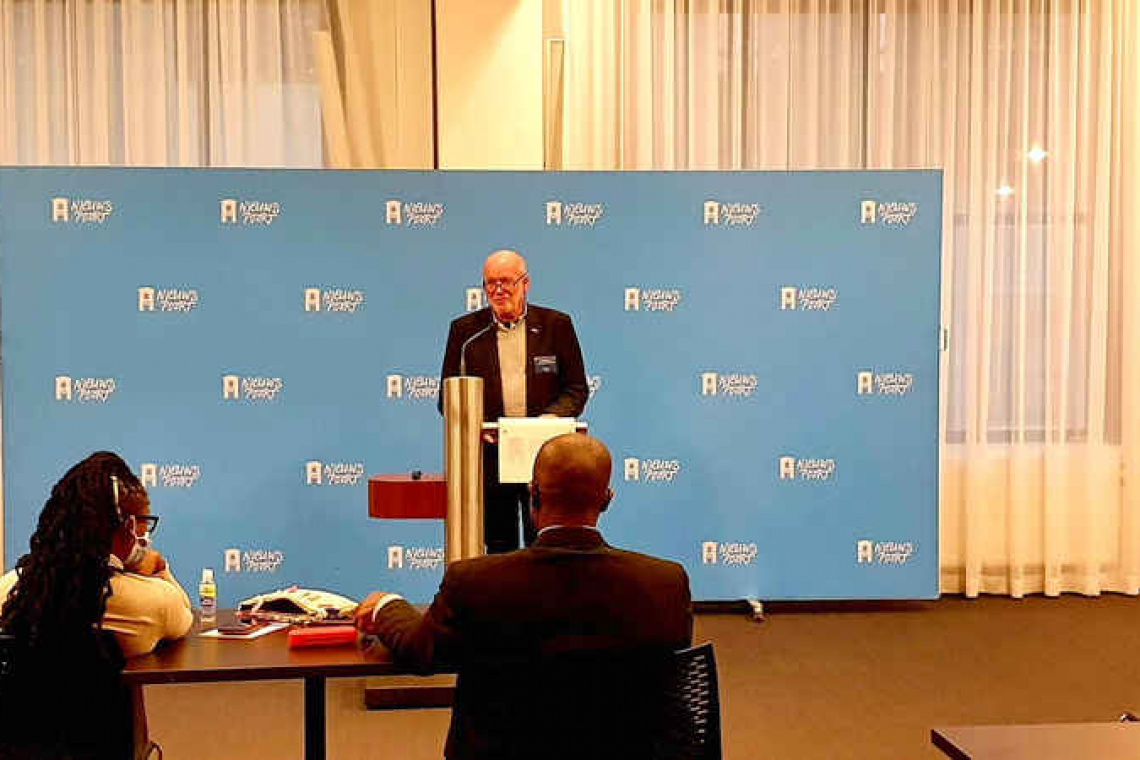Independent member of the Island Council of St. Eustatius Koos Sneek addressing the 31st Congress and Trade Mission of InterExpo in The Hague.
THE HAGUE--Independent St. Eustatius Island Council Member Koos Sneek during a congress in The Hague on Thursday was highly critical about the duration of the Dutch intervention in Statia, the role of the government commissioner and the lack of understanding from The Hague.
InterExpo
Sneek was one of the many speakers from different parts of the kingdom at the 31st Congress and Trade Mission of InterExpo, organised by Peter Oerlemans. This year’s theme was “Ten Years after the Dismantling of the Netherlands Antilles”. The event was supposed to take place last year, but was then cancelled due to the COVID-19 pandemic.
Early 2018, the Dutch government sent the Statia government, including the Island Council, home due to severe negligence. “Four years down the line and there is no end in sight as yet,” said Sneek, who pointed out that under the current law, the intervention can last up to 7.5 years in total.
“And all this time, they are busy ticking off the set criteria. The government commissioner is a civil servant of the Ministry of Home Affairs and Kingdom Relations BZK, and has to report weekly. She [Alida Francis – Ed.] has to execute what the civil servants in The Hague find important. Own policy is avoided, because, after all, the civil servants in The Hague know it all better,” said Sneek.
According to Sneek, matters that are considered important locally are ignored – matters such as affordable air connectivity, proper bank and postal services, lowering the high cost of living, introducing a Citizen Service Number BSN, or setting up a dialysis centre for kidney patients.
The fact that the Statia oil terminal is in financial trouble and that 130 direct jobs and many more indirect jobs are at stake does not seem to bother The Hague. “That may not seem a lot for the Netherlands, but when the oil terminal goes belly-up, Statia’s economy will be in shambles. Yet, I don’t sense no urgency from the government commissioner or The Hague.”
In Sneek’s opinion, these important matters receive no attention from the government commissioner who is busy with the famous 12 criteria, following orders of the BZK Ministry and executing projects that she thinks are good for the island.
“The current Island Council is left hanging. It has limited authority and no means to enforce policy. As soon as it involves financial implications, we have no say,” said Sneek.
Interference
By stretching out the interference as long as possible, The Hague hopes to prevent that the same parties that were in power at the time of the intervention can again form an Executive Council, said Sneek. “That our democratic principles are violated along the way is a detail.”
Sneek was critical of the appointment of Government Commissioner Alida Francis and Acting Government Commissioner Claudia Toet, who he said are civil servants without any experience in running government.
Francis, he said, tried to press the Island Council into accepting the timeline to restore democracy. “As Island Council, we are supposed to accept the unilaterally drafted time-path, which will take years, without questions. Don’t nag and especially don’t be critical,” said Sneek, who pointed out that, contrary to earlier promises, the Island Council was not consulted in the process of drafting the timeline. The government commissioner continues to execute the timeline which the Island Council rejected.
The Island Council is told that it is posing too many questions, which would burden the civil servants’ apparatus and that Island Council members are voting against proposals, which is interpreted as sabotage. “I think that the law somewhere says that an Island Council member votes according to his or her conscience.”
Disappointment
The promise by now-caretaker State Secretary of Home Affairs and Kingdom Relations Raymond Knops that he would quickly take care of things after the intervention did not materialise. “It took three years before the first road was constructed. Hired Dutch companies failed and local boys had to finish the job.”
The new airport building, built by a Dutch contractor, is a disappointment too. “The roof leaks and at the check-in counter you either get wet from the rain or are scorched by the sun. The air-conditioning system is full of mildew, and nobody ever thought about the operational cost associated with such an investment.”
Just as in Saba, the Netherlands makes no structural funding available to cover operational and maintenance costs, while the budget depends on incidental funding. “The Island Council has expressed its concerns about this multiple times, because who gets the bill ultimately? And when we cannot get the budget balanced, it will serve as a reason for the next intervention. Is it strange that our Island Council is worried about the future with this ad-hoc financing policy on which we have no influence?”







